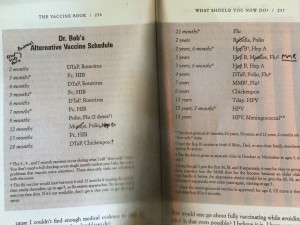As a #NewsMom, you’d better bet I bought the book and even took classes on Alternative Vaccine Schedules. I wanted to be as educated as possible about every option and risk. Apparently, I’m not alone.
A new study by The American Academy of Pediatrics found that, while most doctors try to talk parents out of it, they agree to let parents alter the CDC’s recommended vaccination schedule.
Let’s be clear: this is not about skipping vaccines.
This is not about personal belief exemptions that allow parents to avoid vaccinations altogether for school-aged kids. This study (and blog) is about the decision to spread out the recommended vaccines for children under the age of 2.
What is an Alternative Vaccination Schedule?
In short, instead of getting five vaccinations all at once every two to three months (as recommend by the CDC), parents split up the vaccinations so babies get one or two shots every month. In most cases, the children are totally up-to-date with their vaccinations by the time they come back for their next scheduled visit.
Why do parents do this?
Most blame/praise the Dr. Sears “Vaccine Book” for the increasing trend. For years it was the bible of alternative vaccination schedules. As you can imagine, it is controversial.
NOTE: While the alternative schedule only delays most vaccinations by two to three months, it does push back the MMR (measles) vaccine from 1 year to 3 years of age. Obviously, that has been getting A LOT of criticism in light of the recent measles “outbreak.” Many parents follow the schedule loosely, but get the entire course of MMR at 12 months—as recommend by the CDC.
Google “Dr. Sears Measles” for both sides of that particular debate. The MMR issue was not the focus of the AAP study.
The Findings of the American Academy of Pediatrics:
Most doctors said they were asked to spread out the recommended vaccine schedule.
- 93 percent of doctors reported that parents asked them to delay vaccines in any given month.
- 1 in 5 doctors said more than 10 percent of parents asked for an alternative schedule.
Most doctors said they are against administering alternative (or split) vaccinations schedules.
- 87 percent of doctors said they believe delaying vaccines puts the kids at risk of getting preventable diseases.
- 84 percent believe it is ultimately more painful for children to bring them back for separate injections.
- Anecdotally, doctors and experts I’ve consulted say the CDC schedule is intended to get kids fully vaccinated with the least amount of effort for parents. One of the greatest concerns is that parents won’t come back to complete the vaccinations.
Still, many doctors reported that they gave in and allowed parents to split their vaccinations.
- 1/3 of doctors said they acquiesced “often” or “always.”
- 1/3 agreed to the split schedule only “sometimes.”
- Few refused (2 percent “often/always,” 4 percent “sometimes”).
Doctors said they spend a lot of time dealing with alternative schedules—and they don’t like it.
- AAP doctors said counseling concerned parents about vaccines can take 10 to 14 minutes longer (more than half the average visit).
- As a result, they’re spending less time counseling on other important topics—like safe sleep or toilet training.
- 40 percent of doctors said it has decreased their overall job satisfaction.
Wow. Boy do I feel bad! I hope my pediatrician is not among that last 40 percent.
The alternative vaccination schedule is a pretty common topic among mommy circles in the Bay Area. I’d venture to guess far more than 10 percent of parents here ask for (or about) alternative vaccination schedules.
After reading the book and taking the classes, I decided to go with the alternate schedule for Baby C. However, I acknowledge that more information is not always a good thing. It can make you paranoid (says the mom whose day job exposes her to far too many stories about fluke accidents, scams and hidden dangers)!
As I understood the alternative schedule at the time:
(pregnant with my first child and filled with fear and hormones)
The Pros
- Dr. Sears says because you’re giving your baby just one live viral vaccine at a time, your baby’s body has more time to adjust and better handle possible side effects.
- If by some fluke your baby has a reaction, it’s easier to determine exactly which vaccine the baby is reacting to.
- And then there is the unscientific feeling in your gut that you are going above and beyond as a parent to protect your child from some “potential” unknown danger.
The Cons
- Even Doctor Sears says there is no medical evidence that this precaution is necessary or even useful.
- More shots = more pain. Because many of the vaccines on the recommended CDC schedule are combined into one shot, if you split them up, your baby will ultimately get more individual shots.
- Your baby may be exposed to one of those preventable diseases in the month that you postpone that particular vaccine.
According to the American Academy of Pediatrics, doctors say parents gave a wide variety of reasons for wanting to spread out the vaccines, including:
- Short and long-term complications.
- The belief that their child is unlikely to get a vaccine-preventable disease.
- Concern that their child might develop autism.
As a paranoid first-time mom who researched WAY too much for my own good, I ultimately started out on the split schedule. I also followed other unscientific “recommendations,” like applying numbing cream to the injection site before each shot and nursing during the injection (both intended to ease the pain).
I swear the staff at my pediatrician’s office rolled their eyes every time I walked in the door, but they supported my requests… and as a result I kept coming back, and I kept my kid vaccinated.
(The shots did hurt in an unexpected place—my pocketbook. I had to pay a penalty—ahem—“administration fee” for each shot-only appointment.)
According to the American Academy of Pediatrics, the reasons most doctors said they gave in to parents (like me):
- 82 percent believed if they agreed to the requests, it would build trust with families.
- 80 percent also believed that if they did not agree, families might leave their practice.
- Doctors reported that they tried a variety of strategies to change parents’ minds, but did not think they were effective.
- Anecdotally, the doctors and experts I consulted say they give in because split vaccinations ultimately mean the children will get vaccinated. If it’s all or nothing, there’s a chance parents will chose “nothing.”
Then, around Baby C’s 6 month appointment, we had a substitute pediatrician (ours was off) who pulled the gloves off and gave it to us straight. The shot goes into the muscle, so the numbing cream on the skin isn’t doing much, and “Lady, you’re an idiot if you think you’re protecting your kid by giving her more individual shots!”
Reluctantly, I gave in and let him give her all her vaccinations that day.
As luck would have it, she got her first bad cold the very next day. The two were likely unrelated, but I cried and blamed myself.
Now, at 20 months old, Baby C is totally up to date (and yes, we got her MMR at 12 months as recommended by the CDC—primarily because we live in San Francisco and we travel a lot).
In hindsight, would I do the alternative schedule again?
Right now—today—I’d say if we have another baby, I would keep to the CDC’s recommended vaccination schedule. But honestly, who knows?
I was recently commiserating with a fellow #NewsMom about the head vs. heart debate. As a journalist, your head tells you to listen to the science. As a parent, your gut asks—what if?
What if “they” are wrong?
What if the science changes tomorrow?
Could I live with my decision either way?
Alas, she who lives in a glass house shall not throw stones. As a parent I never judge others (and I hope they give me the same respect).
As a journalist, I can only report what the experts say: “Vaccinations protect those too vulnerable to get vaccinated themselves—and they may just save your kid’s life.”
Doctors are beginning to kick parents out of their practices for choosing not to vaccinate at all.
However, many currently say that if splitting up vaccinations helps to keep kids vaccinated, then they are willing to do it (even if they’d rather not).
- “Study authors point out that delaying or spacing out vaccines puts children and other vulnerable people in the population at risk for vaccine-preventable diseases with potentially severe outcomes. Discussions and interventions need to begin in early pregnancy for parents who are questioning vaccine safety and efficacy. Social networks and public messaging have been shown to play an important role in shaping some parents’ vaccination decisions and should be considered when talking to vaccine-hesitant parents. More study needs to be directed at finding effective ways of countering misinformation about the safety of vaccines.”
For more editorials and blogs like this check out:
Featured Blogs & Reviews feed on NewsMom.com.



wonder if this article would be different if that likely unrelated cold was a likely unrelated death like thousands of mothers
Jack, I agree. This mom is tip-toeing around medical professionals. Where is the other side where parents have to deal with medical staff? Or children who have severe side effects? There’s a reason why the state allowed exemptions. Spacing out vaccines are healthy for the child, recommended by Dr. Sears and yet she still is dancing around the subject focusing on the fears of medical staff and worried if they are up to date? Children have died. There is a reason why this is here: The National Vaccine Injury Compensation Program (VICP or NVICP) was established by the 1986 National Childhood Vaccine Injury Act (NCVIA), passed by the United States Congress in response to a threat to the vaccine supply due to a 1980s scare over the DPT vaccine.—wake up mom…we’re protecting our child on both ends with overloading vaccines and diseases. If spacing them out upsets the medical staff and yet you get to maintain a healthy and vibrant child, then so be it.